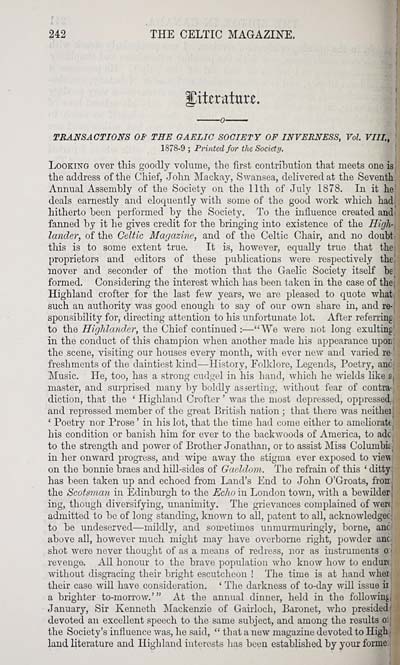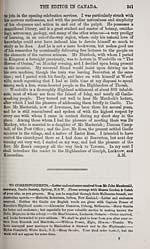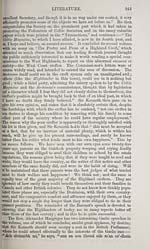Blair Collection > Celtic magazine > Volume 5
(252)
Download files
Complete book:
Individual page:
Thumbnail gallery: Grid view | List view

242 THE CELTIC MAGAZIKE.
%iizxninxz.
TRANSACTIONS OF THE GAELIC SOCIETY OF INVERNESS, Vol. VIII.,
1878-9 ; Printed for the Society.
Looking over tliis goodly volume, the first contribution that meets one is
the address of the Chief, John IMackay, Swansea, delivered at the Seventh:
Annual Assembly of the Society on the 11th of July 1878. In it he
deals earnestly and eloquently with some of the good work which had
hitherto been performed by the Society, To the influence created and
fanned by it he gives credit for the bringing into existence of the Highr ',
lander, of the Celtic Magazine, and of tlie Celtic Chair, and no doubt
this is to some extent true. It is, however, equally true that the
proprietors and editors of these publications were respectively the
mover and seconder of the motion that the Gaelic Society itself be
formed. Considering the interest which has been taken in the case of the
Highland crofter for the last few years, we are pleased to quote what
such an authority was good enough to say of our own share in, and re-
sponsibility for, directing attention to his unfortunate lot. After referring
to the Highlander, the Chief continued : — "We were not long exulting
in the conduct of this champion when another made his appearance upoD:
the scene, visiting our houses every month, with ever new and varied re-
freshments of the daintiest kind — History, Folklore, Legends, Poetry, and) i
Music. He, too, has a strong cudgel in his hand, which he wields like a| j
master, and surprised many by boldly asserting, without fear of contra-; 'i
diction, that the ' Highland Crofter ' was the most depressed, oppressed,) -i
and repressed member of the great British nation ; that there was neithei J
' Poetry nor Prose ' in his lot, that the time had come either to ameliorate v
his condition or banish him for ever to the backwoods of America, to adc
to the strength and power of Brother Jonathan, or to assist IMiss Columbif
in her onward progress, and wipe away the stigma ever exposed to vie^vs
on the bonnie braes and hiU-sides of Gaeldom. The refrain of this ' ditty
has been taken up and echoed from Land's End to John O'Groats, froE
the Scotsman in Edinburgh to the Echo in London town, with a bewilder-
ing, though diversifying, unanimity. The grievances complained of wew
admitted to be of long standing, known to all, patent to all, acknowledges
to be undeserved — mildly, and sometimes unmurmuringly, borne, ancj
above all, however much might may have overborne right, powder anc
shot were never thought of as a means of redress, nor as instruments o:
revenge. All honour to the brave population who know how to euduH
without disgracing their bright escutcheon ! The time is at hand whei
their case will have consideration. ' The darkness of to-day will issue it
a brighter to-morrow.'" At the annual dinner, held in the foUowinj
January, Sir Kenneth ]\Iackenzie of Gairloch, Baronet, who presided
devoted an excellent speech to the same subject, and among the results oi
the Society's influence was, he said, " that a new magazine devoted to High]
land literature and Highland interests lias been established by yoiu' forme:;
%iizxninxz.
TRANSACTIONS OF THE GAELIC SOCIETY OF INVERNESS, Vol. VIII.,
1878-9 ; Printed for the Society.
Looking over tliis goodly volume, the first contribution that meets one is
the address of the Chief, John IMackay, Swansea, delivered at the Seventh:
Annual Assembly of the Society on the 11th of July 1878. In it he
deals earnestly and eloquently with some of the good work which had
hitherto been performed by the Society, To the influence created and
fanned by it he gives credit for the bringing into existence of the Highr ',
lander, of the Celtic Magazine, and of tlie Celtic Chair, and no doubt
this is to some extent true. It is, however, equally true that the
proprietors and editors of these publications were respectively the
mover and seconder of the motion that the Gaelic Society itself be
formed. Considering the interest which has been taken in the case of the
Highland crofter for the last few years, we are pleased to quote what
such an authority was good enough to say of our own share in, and re-
sponsibility for, directing attention to his unfortunate lot. After referring
to the Highlander, the Chief continued : — "We were not long exulting
in the conduct of this champion when another made his appearance upoD:
the scene, visiting our houses every month, with ever new and varied re-
freshments of the daintiest kind — History, Folklore, Legends, Poetry, and) i
Music. He, too, has a strong cudgel in his hand, which he wields like a| j
master, and surprised many by boldly asserting, without fear of contra-; 'i
diction, that the ' Highland Crofter ' was the most depressed, oppressed,) -i
and repressed member of the great British nation ; that there was neithei J
' Poetry nor Prose ' in his lot, that the time had come either to ameliorate v
his condition or banish him for ever to the backwoods of America, to adc
to the strength and power of Brother Jonathan, or to assist IMiss Columbif
in her onward progress, and wipe away the stigma ever exposed to vie^vs
on the bonnie braes and hiU-sides of Gaeldom. The refrain of this ' ditty
has been taken up and echoed from Land's End to John O'Groats, froE
the Scotsman in Edinburgh to the Echo in London town, with a bewilder-
ing, though diversifying, unanimity. The grievances complained of wew
admitted to be of long standing, known to all, patent to all, acknowledges
to be undeserved — mildly, and sometimes unmurmuringly, borne, ancj
above all, however much might may have overborne right, powder anc
shot were never thought of as a means of redress, nor as instruments o:
revenge. All honour to the brave population who know how to euduH
without disgracing their bright escutcheon ! The time is at hand whei
their case will have consideration. ' The darkness of to-day will issue it
a brighter to-morrow.'" At the annual dinner, held in the foUowinj
January, Sir Kenneth ]\Iackenzie of Gairloch, Baronet, who presided
devoted an excellent speech to the same subject, and among the results oi
the Society's influence was, he said, " that a new magazine devoted to High]
land literature and Highland interests lias been established by yoiu' forme:;
Set display mode to: Large image | Transcription
Images and transcriptions on this page, including medium image downloads, may be used under the Creative Commons Attribution 4.0 International Licence unless otherwise stated. ![]()
| Early Gaelic Book Collections > Blair Collection > Celtic magazine > Volume 5 > (252) |
|---|
| Permanent URL | https://digital.nls.uk/76451824 |
|---|
| Description | Volume V, 1880. |
|---|---|
| Shelfmark | Blair.6 |
| Attribution and copyright: |
|
| Description | A selection of books from a collection of more than 500 titles, mostly on religious and literary topics. Also includes some material dealing with other Celtic languages and societies. Collection created towards the end of the 19th century by Lady Evelyn Stewart Murray. |
|---|
| Description | Selected items from five 'Special and Named Printed Collections'. Includes books in Gaelic and other Celtic languages, works about the Gaels, their languages, literature, culture and history. |
|---|

